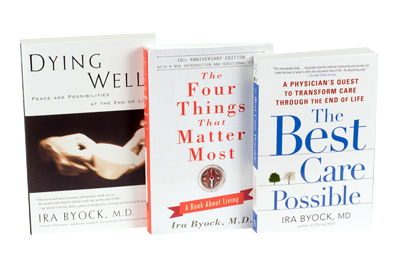
Transforming care through the end of life
Byock’s first book, Dying Well, (1997) has become a standard in the field of hospice and palliative care. The Four Things That Matter Most, (2004) is used as a counseling tool widely by palliative care and hospice programs, as well as within pastoral care. His most recent book, The Best Care Possible tackles the crisis that surrounds serious illness and dying in America and his quest to transform care through the end of life. It has been praised by the Wall Street Journal, the Economist and other major publications, and won the Annual Books for a Better Life Award in the category of Wellness.
The Four Things That Matter Most:
10th Anniversary Edition: A Book About Living
Four simple phrases: “Please forgive me,” “I forgive you,” “Thank you,” and “I love you” — carry enormous power to mend and nurture our relationships and inner lives. These four phrases and the sentiments they convey can help us resolve interpersonal difficulties with integrity and grace. In The Four Things That Matter Most, Dr. Ira Byock, an international leader in palliative care, explains how we can practice these life-affirming words in our day-to-day lives and improve our emotional well-being. He demonstrates the value of “stating the obvious” in letting the people we love know that we love them and provides practical insights into the benefits of letting go of old grudges and toxic emotions.
Dying Well:
The Prospect for Growth at the End of Life
In 1997, too many Americans were dying in hospitals, often in pain, often alone. Progress has been made in alleviating pain and expanding hospice and palliative care for people nearing the end of their lives. Yet, even today, too many people are dying badly! The stories in Dying Well enable readers to imagine that wellbeing is possible through these most difficult times of life. This book remains as vital and valuable to individuals and their families today as it did when it was first published.
The Best Care Possible:
A Physician’s Quest to Transform Care Through the End of Life
A doctor on the front lines of hospital care illuminates one of the most important and controversial social issues of our time. It is harder to die in this country than ever before. Though the vast majority of Americans would prefer to die at home—which hospice care provides—many of us spend our last days fearful and in pain in a healthcare system ruled by high-tech procedures and a philosophy to “fight disease and illness at all cost.” Dr. Ira Byock, one of the foremost palliative-care physicians in the country, argues that how we die represents a national crisis today. To ensure the best possible elder care, Dr. Byock explains we must not only remake our healthcare system but also move beyond our cultural aversion to thinking about death. The Best Care Possible is a compelling meditation on medicine and ethics told through page-turning life-or-death medical drama. It has the power to lead a new national conversation.

Foreign Translations
The Best Care Possible
French Les Meilleurs Soins Possibles - ISBN 978-2-89733-415-4 Canada: Editions ADA Inc. France: D.G. Diffusion, Z.I des Bogues, 31750 Escalquens, France; Tel. 05.61.00.09.99 Switzerland: Transat; Tel. 23.42.77.40 Belgium: D.G. Diffusion; Tel. 05.61.00.09.99
Dying Well
Japanese: Dying Well - ISBN 4-88135-560-0 C0098 Tuttle-Mori Agency Inc., Tokyo, Japan German: Sterben: Wachsen im Umgang mit dem Tod – ISBN 3-426-26926-0 Germany: Ventura Publisher im Verlag
The Four Things That Matter Most
Chinese: The Four Things That Matter Most – ISBN 978-986-248-620-7 Taiwan: Heliopolis Publishing Korean: The Four Things That Matter Most – ISBN 979-11-6220-287-6 Korea: Mulpure Publishing, Inc., 2F, 961-11 Hokye-dong, Dongan-gu, Angyang-si, Kyungki-do, 431-080, Republic of Korea Spanish: Decir Lo Que Importa: Perdoname, Te Perdono, Gracias, Te Quiero – ISBN 84-7953-612-8 Spain: Ediciones Urano, S. A., Aribau142, pral.-08036 Barcelona, Espanya www.edicionesurano.comOther Books
Co-authored and Co-edited by Ira Byock – primarily for Clinicians and Academics

Palliative and End-of-Life Pearls
Co-authored with John E.Heffner, MD, Hanley and Belfus, Inc., 2002
This addition to the popular Pearls Series® presents 71 case presentations of clinical interest related to end-of-life and palliative care for both hospitalized patients and patients receiving home care. The patient vignettes highlight considerations of pain and symptom management at the end of life, ethical issues related to life-supportive care, and approaches to assisting patients and families with the difficulties that surround death and dying.

























